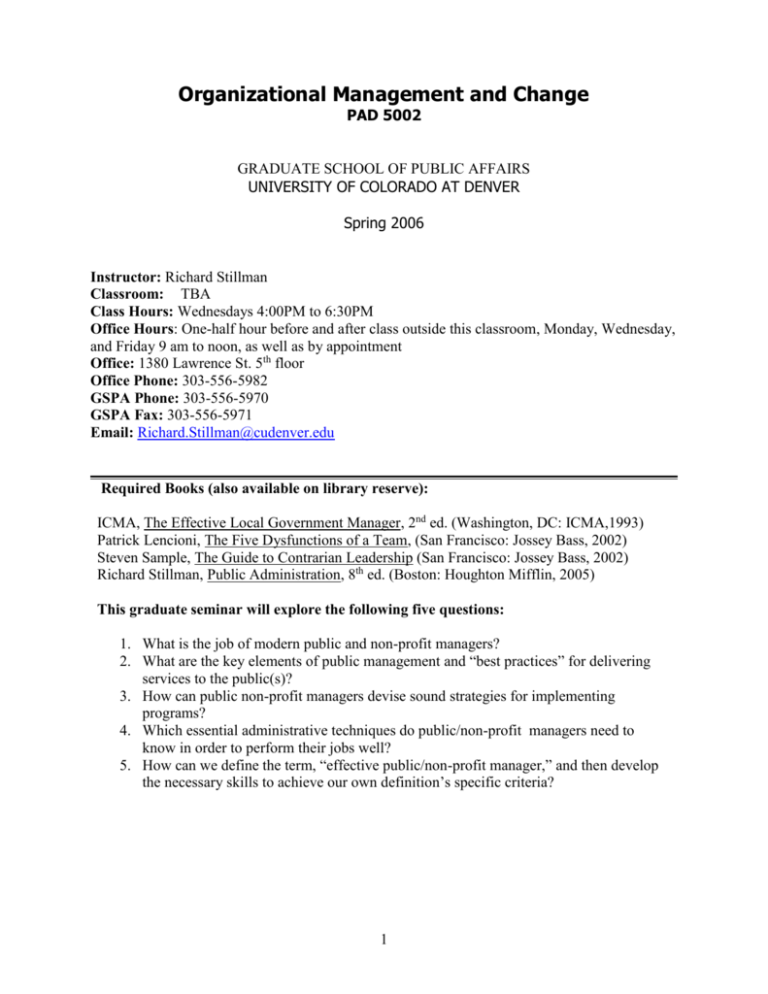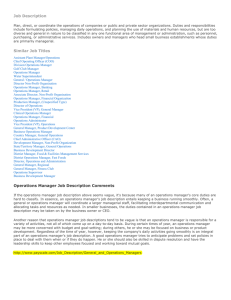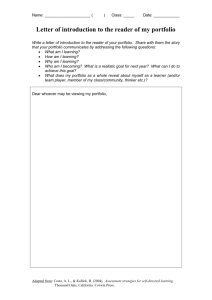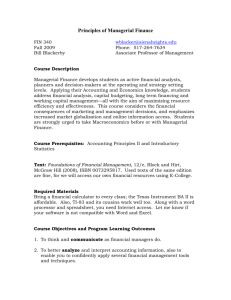PAD5002-001 Stillman - University of Colorado Denver
advertisement

Organizational Management and Change PAD 5002 GRADUATE SCHOOL OF PUBLIC AFFAIRS UNIVERSITY OF COLORADO AT DENVER Spring 2006 Instructor: Richard Stillman Classroom: TBA Class Hours: Wednesdays 4:00PM to 6:30PM Office Hours: One-half hour before and after class outside this classroom, Monday, Wednesday, and Friday 9 am to noon, as well as by appointment Office: 1380 Lawrence St. 5th floor Office Phone: 303-556-5982 GSPA Phone: 303-556-5970 GSPA Fax: 303-556-5971 Email: Richard.Stillman@cudenver.edu Required Books (also available on library reserve): ICMA, The Effective Local Government Manager, 2nd ed. (Washington, DC: ICMA,1993) Patrick Lencioni, The Five Dysfunctions of a Team, (San Francisco: Jossey Bass, 2002) Steven Sample, The Guide to Contrarian Leadership (San Francisco: Jossey Bass, 2002) Richard Stillman, Public Administration, 8th ed. (Boston: Houghton Mifflin, 2005) This graduate seminar will explore the following five questions: 1. What is the job of modern public and non-profit managers? 2. What are the key elements of public management and “best practices” for delivering services to the public(s)? 3. How can public non-profit managers devise sound strategies for implementing programs? 4. Which essential administrative techniques do public/non-profit managers need to know in order to perform their jobs well? 5. How can we define the term, “effective public/non-profit manager,” and then develop the necessary skills to achieve our own definition’s specific criteria? 1 Discussion of the Seminar: Goals, Topics, and Assignments The class will begin by wrestling with the first question: what is the job of modern public/ non-profit managers? The opening session attempts to explore “the big picture” of public / non-profit mangers roles by discussing the “pros” and “cons” of Steven Sample’s The Guide to Contrarian Leadership to set the stage, so to speak, for comprehending the peculiar challenges facing present-day managers. Issues to be addressed include: Why are the jobs of public / non-profit managers unique today? Why is managing within the American administrative system unusually difficult? What are the key roles of public/non-profit managers? Why is seeing “the big picture” so critical for understanding the uniqueness of this line of work? What themes does Sample suggest for being effective in this line of work? Do you agree or disagree with his arguments? Second, this course endeavors to analyze systematically the major elements of public management, i.e. goal setting, motivating of employees, etc. What are the difficulties of performing each one? Their special values, processes, methods, and skill requirements for effective management? Every other weekly session will begin by summing up the points in an assigned chapter of The ICMA text. At the start of the semester students will be assigned to a team that will analyze one chapter and discuss “a best practice” example related to that chapter topic. The aim of this exercise will be to help students to comprehend the “basics” of public and non-profit management as well as their “best practice applications.” Third, whatever ‘best practice” is chosen as most appropriate, current and future managers in government and the non-profit sector must continuously learn to craft “micro-strategies” in order to bring about successful organizational change and program implementation. Drawing upon chapters from The Effective Local Manager, during sessions every other week, students will role play various strategic choices confronting modern managers such as how to “sense the bureaucratic landscape,” “work with an elected board,” etc. In small groups students will be asked to “brainstorm” hypothetical cases that typically face public/non-profit managers and devise useful strategies in order to “solve” the problem at hand. By repeated strategizing exercises in the context of applied situations, class members hopefully can draw some helpful lessons about what works best, or does not work, for promoting effective program management. Fourth, learning basic techniques of management throughout the course will be stressed as well. Students are expected to prepare a “management skills portfolio” in a loose-leaf binder, due at the end of the course, containing essential managerial techniques, such as “a memo,” “personnel evaluation,” “position-paper,” etc. (each assignment should be no longer than two to three typewritten pages). Every other week a team of students will instruct the class on “the best practices” that they have discovered related to one particular technique assigned. Students will meet in groups to review the development of that technique in their individual “management skills portfolios.” By the end of the class everyone should have created a “portfolio” containing their versions of an “ideal” memo, personnel evaluation, position paper, etc. Specific exercises will be drawn from “real life cases.” The particulars about these assignments as well as the times when they will be due are outlined in the syllabus. 2 Ultimately, this graduate seminar aims to help each class member arrive at his or her own definition about what is an effective public/non-profit manager. Through readings, discussions, debates, role-playing, developing a skills portfolio, and case analyses, hopefully individuals can decide by the end of the course how they define that term as well as possibly arrive at a clearer notion about the key skills required for their own future managerial success. What are my own strengths and weaknesses for performing well in this line of work? The knowledge needed to be acquired in the future in order to become an effective manager? Obviously this class cannot, nor will not, teach you everything you need to know in order to achieve managerial success. However, it may assist you at sorting out what qualities you already possess for managing as well as which ones may be necessary for you to acquire in the future so as to improve your potential for effective public/nonprofit management. Grades will be determined by: 40% -- Management Skills Portfolio 30% -- Class Participation 30% -- Final Exam Some Basic Ground Rules: In order to make this seminar successful, a few reminders are in order: 1) Be on time to class and if you are absent, please tell the instructor, ahead of time; 2) Thoroughly read the assignments prior to coming to class and be prepared actively to engage in discussions; 3) No late papers are allowed; 4) Incompletes cannot be given for this course; 5) For group assignments, each person will be expected to contribute his or her fair share; 6) Those who sign up for this class as PAD 7002 must see the instructor by the 2nd meeting for additional assignments; 7) By the 2nd week, each student will turn in a brief bio statement including name, address, phone number, email, etc; and 8) Drafts of the specific “management portfolio” skill technique under discussion will be due on the date when it is assigned and should be no longer than 2 to 3 typewritten pages. 3 “The Order of March” January 18th Introductions, Class Orientation, and Discussion of Syllabus January 25th Group Organization and Assignments February 1st What is the job of the modern public/ non-profit manager? Reading: skim entire Steven Sample’s The Guide to Contrarian Leadership February 8th Managerial Skill Discussion: “The Memo” and “GANT Chart” Portfolio Assignment: From case 1 in Stillman’s PA, “The Blast in Centralia No. 5,” write a memo from Federal Mine Inspector Perz to the Secretary of the Navy urging the closure of the mine prior to the explosion, with a GANT Chart attached, showing the specific steps recommended for clean-up. February 15th Best Practices : How to Analyze the External Environment of Public Organizations? Strategizing Exercise: The Effective Manager, chapter 2 February 22nd Managerial Skill Discussion: “The Options Paper” Portfolio Assignment: From case 7 in PA, “The Decision to Go to War with Iraq.” Prepare an options paper for the U.S. President about his choices available prior to going to war in Iraq. March 1st Best Practices: How to Enhance Cooperation Working with the Governing Board? Strategizing Exercise: The Effective Manager, chapter 3. March 8th Managerial Skill Discussion: “Performance Evaluation” Portfolio Assignment: From case 11 in PA, “Who Brought Bernadine Healy Down?” Frame job requirements and criteria for evaluating the performance of Bernadine Healy’s successor at the Red Cross. March 15th Best Practices: How to Understand and Motivate People? Strategizing Exercise: The Effective Manager, chapter 4 March 22nd NO CLASS SPRING BREAK!!! March 29th Managerial Skill Discussion: “SWOT Analysis” Portfolio Assignment: From case 4 in PA, “The Columbia Accident” as a NASA engineer, outline for Linda Ham, Chair of Mission Management Team, a SWOT analysis prior to launching the Columbia Shuttle. April 5th Best Practices: How to Manage Effectively Organizations and Programs? Strategizing Exercise: The Effective Manager, chapter 5 4 April 12th Managerial Skill Discussion: “Strategic Communications Plan” Portfolio Assignment: From case 9,” “The Shootings at Columbine High School.” Develop a communication plan for Jefferson County Sheriff John Stone after the Columbine Shootings in order to improve law enforcement communications and coordination. April 19th Best Practices: How to Relate to Other Governments? Strategizing Exercise: The Effective Manager, chapter 6. April 26th Managerial Skill Discussion: “Meeting Agenda and Format” Portfolio Assignment: From case 16 in PA, “The Case of Butterfly Ballot.” Outline for Theresa LaPose, Elections Supervisor of Palm Beach County, Florida, a successful meeting agenda and meeting format prior to the November 2000 presidential election for redesigning the Palm Beach County Voter Ballot. May 3rd What is an Effective Manager? Read: chapters 1 & 8 in The Effective Manager. Managerial Skills Portfolio Due (in addition, include the “minutes” of one class discussion during the term and prepare a brief book review reflecting on your team experiences in relationship to Lencioni’s Five Dysfunctions of Team ideas in no more than three Pages). May 10th Three Hour Final Exam 5 A BREIF BIOGRAPHICAL STATEMENT Richard J. Stillman II is a Professor of Public Administration at the Graduate School of Public Affairs, University of Colorado at Denver. He taught on the faculties of George Mason University and California State University-Bakersfield and is the author or editor of several books including: The Integration of Negro in the U.S. Armed Forced, The Rise of the City Manger, A Search for Public Administration (with Brack Brown), Professions in Government (with Frederick C. Mosher), Results – Oriented Budgeting, The American Bureaucracy, The American Constitution and Administrative State, The Effective Local Government Manager (with Wayne Anderson and Chester Newland), Preface to Public Administration, The Modern State and its Study (with Walter Kickert), Creating the American State, and Basic Documents of American Public Administration Since 1950. He is an elected fellow in the National Academy of Public Administration and his textbook, Public Administration: Concepts and Cases, 8th edition is used at over 400 universities and colleges. His books have been translated into Chinese, Korean, and Hungarian and he received Mosher Award for distinguished scholarship and is currently editor in chief of the Public Administrative Review. 6







